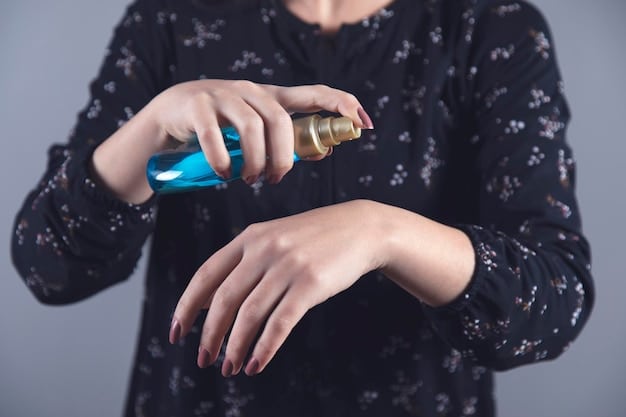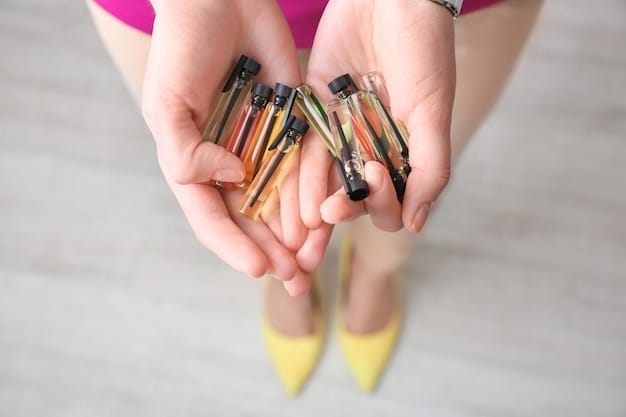Fragrance and Skin Chemistry: Unlocking Your Unique Scent

Anúncios
Fragrance and skin chemistry interact uniquely, influencing how a perfume smells on different individuals due to factors like skin pH, hydration, and body temperature, making fragrance selection a personal experience.
Anúncios
Have you ever noticed how a fragrance smells amazing on a friend, but completely different – and not in a good way – on you? The secret lies in the fascinating interplay of fragrance and skin chemistry. Let’s dive into how your body affects scent.
Understanding the Basics of Fragrance and Skin Interaction
The way a fragrance smells isn’t just about the blend of notes created by the perfumer. Our skin acts as a canvas, interacting with these notes and subtly altering the scent. Several factors contribute to this interaction, making fragrance truly personal.
Anúncios
Understanding these basics can help you make more informed choices when selecting a new fragrance. It’s not about finding the most popular scent, but rather finding the scent that harmonizes with your individual chemistry.
Skin’s Natural Oils and pH Levels
Our skin produces natural oils, sebum, which vary from person to person. These oils can either enhance or dampen certain fragrance notes. Skin pH, a measure of acidity, also plays a crucial role. A slightly acidic pH is ideal for many fragrances, but variations can change the scent profile.
Individuals with drier skin tend to find that fragrances fade more quickly, as there are fewer oils to bind the scent molecules. Those with oilier skin, on the other hand, may find that scents last longer and project more intensely, potentially altering the fragrance’s development.
The Influence of Body Temperature
Body temperature affects how quickly fragrance molecules evaporate. Warmer skin encourages faster evaporation, causing the top notes to dissipate more rapidly and revealing the middle and base notes sooner. Conversely, cooler skin slows down the evaporation process.
This means that the same fragrance can evolve differently depending on your body temperature. During warmer months or after physical activity, the fragrance may appear stronger and more complex. In cooler temperatures, the scent might remain more subtle.

- Oily skin tends to hold fragrance longer due to increased binding.
- Skin pH affects the chemical reactions of fragrance compounds.
- Warmer skin makes fragrances evaporate faster, altering the scent profile.
In conclusion, the interaction between fragrance and skin is a multifaceted process influenced by individual skin characteristics and environmental factors. Understanding these elements helps in selecting fragrances that truly complement personal chemistry.
Key Factors Affecting Fragrance Longevity
Beyond the initial interaction, fragrance longevity – how long a scent lasts on your skin – is influenced by several factors. From skin hydration to the fragrance’s composition, numerous aspects can affect its staying power.
Understanding these factors allows you to optimize your fragrance application and choose scents that are more likely to last throughout the day.
Skin Hydration and Its Impact
Hydrated skin retains fragrance molecules more effectively than dry skin. When skin lacks moisture, it struggles to hold onto the scent, leading to faster evaporation. Applying a fragrance to well-moisturized skin can significantly extend its longevity.
Using a complementary, unscented lotion or moisturizer before applying your fragrance can create a better base for the scent to adhere to. This simple step can make a noticeable difference in how long the fragrance lasts.
Fragrance Concentration and Notes
The concentration of fragrance oils in a perfume determines its strength and longevity. Perfumes are typically categorized as eau de parfum (EDP), eau de toilette (EDT), eau de cologne (EDC), and parfum, with parfum having the highest concentration.
Heavier base notes, such as woods, resins, and musks, tend to last longer than lighter top notes like citruses and fruits. Choosing a fragrance with a higher concentration and a strong base can increase its longevity.
Lifestyle and Environmental Influences
Your lifestyle and the environment you’re in can also affect how long a fragrance lasts. Physical activity, exposure to sunlight, and climate conditions can all play a role. Sweat and heat can accelerate the evaporation of fragrance molecules.
In hot and humid environments, fragrances may project more intensely but also fade more quickly. In contrast, cooler environments may prolong the scent’s life but reduce its projection. Adjusting your fragrance choice and application based on your lifestyle and environment can help you maintain a consistent scent experience.
- Hydrated skin holds fragrance longer by providing a better binding surface.
- Higher fragrance concentrations generally mean longer-lasting scents.
- Lifestyle and environmental factors can influence how quickly a fragrance fades.
In summary, fragrance longevity is influenced by skin hydration, fragrance composition, and lifestyle. Taking these factors into account when selecting and applying fragrances can help you achieve a more consistent and enduring scent profile.
How Perfume Notes Interact With Your Body
The individual notes within a perfume interact with your body chemistry in unique ways, contributing to the overall scent experience. Top, middle, and base notes each behave differently, influencing how the fragrance evolves on your skin.
Understanding these interactions can help you anticipate how a fragrance will develop and change over time, ensuring that you choose scents that remain appealing throughout their wear.
The Initial Impression: Top Notes
Top notes are the first scents you perceive after applying a fragrance. These are typically light, volatile molecules that create the initial impression. Common top notes include citrus, fruits, and herbs like bergamot, lemon, and mint.
Because of their light nature, top notes evaporate quickly, usually within 15 minutes to an hour. They provide a fresh, vibrant opening that transitions into the heart of the fragrance.
The Heart of the Fragrance: Middle Notes
Middle notes, also known as heart notes, emerge after the top notes have faded. These form the core of the fragrance and provide its characteristic aroma. Common middle notes include floral and spice elements such as rose, jasmine, and cinnamon.
Middle notes last longer than top notes, usually persisting for several hours. They blend with your skin’s natural scent to create a unique, personal fragrance.
The Lasting Foundation: Base Notes
Base notes are the foundation of the fragrance and provide its depth and longevity. These are typically rich, heavy molecules like woods, resins, and musks. Common base notes include sandalwood, cedarwood, vanilla, and amber.
Base notes are the last to emerge and can last for several hours, even a full day. They provide a lasting impression and contribute to the overall complexity and richness of the fragrance.

- Top notes provide the initial, fleeting impression.
- Middle notes form the heart and character of the fragrance.
- Base notes offer depth, longevity, and a lasting impression.
In conclusion, perfume notes interact with your body in a sequential manner, each contributing to the overall scent experience. Understanding how these notes evolve on your skin allows you to select fragrances that offer a harmonious and enduring aroma.
Choosing the Right Fragrance for Your Skin Type
Selecting a fragrance that complements your skin type is essential for achieving the best scent experience. Different skin types interact with fragrances in unique ways, influencing their longevity and intensity.
By understanding your skin type and its characteristics, you can navigate the world of fragrances with greater confidence and choose scents that truly harmonize with your personal chemistry.
Fragrance Recommendations for Oily Skin
Oily skin tends to hold fragrance longer and project it more intensely. For this skin type, it’s best to opt for lighter, fresher scents that won’t become overwhelming. Citrus, aquatic, and green fragrances work well.
Avoid overly sweet or heavy fragrances, as they can become cloying on oily skin. Look for eau de toilettes or eau de colognes, which have a lower concentration of fragrance oils.
Fragrance Options for Dry Skin
Dry skin tends to absorb fragrance quickly, leading to shorter longevity. For this skin type, richer, more concentrated fragrances like eau de parfums or parfums are ideal. Look for scents with warm, enveloping base notes such as vanilla, amber, and musk.
Applying a moisturizer before spritzing on your fragrance can help extend its longevity. Consider using a complementary, unscented lotion or body oil to create a base for the fragrance to adhere to.
Fragrance Choices for Normal Skin
Normal skin typically offers a balanced canvas for fragrances, allowing for a wide range of scent options. You can experiment with different fragrance families and concentrations to find what you enjoy most. Floral, fruity, and woody scents all work well.
Pay attention to how the fragrance develops on your skin throughout the day and adjust your choice based on personal preference. With normal skin, you have the flexibility to explore and discover new favorites.
- Oily skin benefits from lighter, fresher fragrances.
- Dry skin thrives with richer, more concentrated scents.
- Normal skin allows for experimentation with various fragrance families.
In summary, choosing the right fragrance for your skin type involves understanding how scents interact with your skin’s unique characteristics. By tailoring your fragrance selection to your skin type, you can enhance its longevity and enjoy a more personalized scent experience.
External Factors That Change Perfume’s Scent
External factors such as climate, diet, and medications can significantly impact how a perfume smells on your skin. These elements introduce variables that alter your body’s natural chemistry, subsequently affecting the fragrance’s profile.
Awareness of these external influences can help you adjust your fragrance choices and application methods to maintain a consistent and pleasing scent experience, regardless of changing conditions.
Climate Conditions and Humidity
Climate conditions, particularly humidity levels, play a crucial role in how a perfume is perceived. High humidity intensifies fragrances, making them project more strongly and potentially altering their balance. In such environments, lighter scents are often more comfortable.
Dry climates, on the other hand, can cause fragrances to evaporate more quickly, reducing their longevity. Richer, more concentrated scents may be necessary to maintain a noticeable fragrance throughout the day in arid conditions.
Diet and Its Effect on Body Odor
Your diet can influence your natural body odor, which in turn affects how a fragrance interacts with your skin. Spicy foods, garlic, and certain strong-smelling ingredients can alter your body’s scent, potentially changing the overall fragrance profile.
A balanced diet, rich in fruits and vegetables, can help maintain a neutral body odor, allowing fragrances to shine without interference. Hydration is also key, as it helps regulate body temperature and prevent excessive sweating, which can alter a fragrance’s scent.
Medications and Their Influence
Certain medications can impact your body chemistry, affecting how a perfume smells. Some medications can alter hormone levels or influence the pH balance of your skin, leading to changes in fragrance perception. Antibiotics and hormone therapies are particularly notable in this regard.
If you notice significant changes in how your fragrances smell after starting a new medication, it may be necessary to adjust your scent choices or application methods. Consulting with a dermatologist or fragrance expert can provide personalized guidance.
- Climate conditions, like humidity, intensify fragrance projection.
- Diet influences body odor, affecting fragrance interaction.
- Medications can alter body chemistry, changing fragrance scent.
In conclusion, external factors significantly influence how a perfume smells, underscoring the importance of considering these elements when selecting and applying fragrances. By adapting to these factors, you can ensure a consistently pleasant and personalized scent experience.
Tips for Making Your Fragrance Last Longer
Maximizing the longevity of your fragrance involves employing strategic application techniques and fragrance layering. These methods help the scent adhere better to your skin and create a more enduring and captivating aroma.
By incorporating these tips into your fragrance routine, you can enjoy a longer-lasting and more personalized scent experience, ensuring that your fragrance remains noticeable and appealing throughout the day.
Applying Fragrance to Pulse Points
Pulse points, such as the wrists, neck, and behind the ears, are areas where blood vessels are close to the skin’s surface and generate heat. Applying fragrance to these areas can help activate the scent and enhance its projection.
Gently dab, rather than rub, the fragrance onto these points to avoid breaking down the scent molecules prematurely. The heat from your pulse points will gradually release the fragrance throughout the day.
Layering Fragrances for Added Depth
Fragrance layering involves using multiple products with complementary scents, such as body wash, lotion, and perfume, to create a more complex and lasting aroma. Start with a scented body wash, follow with a matching lotion, and finish with your perfume.
This technique helps the fragrance build upon itself, creating a multi-dimensional scent that lasts longer than applying a single product. Choose products that share similar notes or fragrance families to ensure a harmonious blend.
Storing Fragrances Properly
Proper storage can extend the shelf life and maintain the integrity of your fragrances. Store perfumes in a cool, dark place away from direct sunlight and extreme temperatures. Heat and light can break down the fragrance molecules, altering the scent and reducing its longevity.
Keep bottles tightly closed to prevent evaporation and oxidation. Consider storing your fragrances in their original boxes or in a dedicated fragrance cabinet to protect them from environmental damage.
- Apply fragrance to pulse points for enhanced projection.
- Layer fragrances with complementary scents for added depth.
- Store fragrances in a cool, dark place to maintain their integrity.
In summary, making your fragrance last longer involves strategic application, layering techniques, and proper storage. By incorporating these methods into your fragrance routine, you can enjoy a more enduring and personalized scent experience, ensuring that your fragrance remains captivating throughout the day.
| Key Point | Brief Description |
|---|---|
| 🧪 Skin Chemistry | Individual skin pH and oils affect fragrance. |
| 💧 Hydration | Moisturized skin retains fragrance longer. |
| 🌡️ Temperature | Warm skin accelerates fragrance evaporation. |
| ☀️ Environment | Climate and lifestyle impact scent longevity. |
FAQ
▼
Individual skin chemistry, including pH and natural oils, interacts uniquely with fragrance notes, causing variations in scent perception. Genetics, diet, and skin hydration also play a role.
▼
Apply fragrance to pulse points, moisturize your skin beforehand, and consider layering fragrances with complementary scents. Proper storage in a cool, dark place can also extend its longevity.
▼
Yes, skin type influences how fragrance projects and lasts. Oily skin benefits from lighter scents, while dry skin thrives with richer, more concentrated fragrances. Normal skin offers a wider range of options.
▼
External factors like climate, diet, and medications can alter body chemistry, affecting how a perfume smells. Humidity intensifies fragrances, while certain foods and medications can change body odor.
▼
Fragrance notes include top, middle, and base notes. Top notes are the initial scents, middle notes form the heart, and base notes provide depth and longevity. They interact sequentially, evolving over time.
Conclusion
Understanding the intricate relationship between fragrance and skin chemistry allows for a more personalized and satisfying scent experience. By considering factors like skin type, external influences, and fragrance composition, you can choose scents that harmonize with your unique chemistry and create a lasting impression.






